UBC’s Dr. Melinda Suto examines the impact of community gardening on people living with severe mental illness.
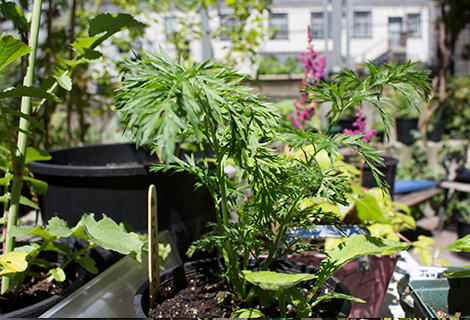
The Coast Wellness Garden on Seymour Street, Vancouver.
Two years ago, the rooftop patio on Seymour Street was like any other in downtown Vancouver: a basic concrete yard for tenants to take in a view of neighbouring high-rises; a landing for smokers to exchange a few words between draws on their cigarettes.
Today, the scene is much different. Where cigarette butts once lined the ground, potting containers, overflowing with basil and oregano can be found. Tomato plants creep and curl along stakes, young asparagus shoots sprout through rich, dark soil, and peas hang heavy off the vines.
To outsiders, the newly-established rooftop garden may look like many others that have sprung up over Vancouver’s downtown core in recent years, but this particular site is unique — set atop the Coast Mental Health Resource Centre, and tended by a group of gardeners with a history of severe mental illness.
“It’s a complete transformation,” says UBC’s Melinda Suto, an associate professor in the Department of Occupational Science and Occupational Therapy, who is serving as a principal investigator on a research initiative exploring the impact of community gardening on the wellbeing of people with severe mental illness living in supported housing.
And while the arrival of plants has certainly changed the appearance of the rooftop patio, Dr. Suto hopes the true transformation will take place among the group of study participants, now all active gardeners.
“People with severe mental illness who live in supported housing are at a higher risk for being socially isolated and not engaging with their community,” says Dr. Suto.
It was this recognition that drove Dr. Suto to examine how participation in a leisure activity or simple occupation, like community gardening, could help mitigate the isolating effect of severe mental illness, and improve overall wellbeing.
Today, thanks to grant support from the Vancouver Foundation, Dr. Suto is two years in to a three-year community-based participatory research (CBPR) project — a partnership with Coast Mental Health — set to determine how the simple act of planting a seed and watching something grow can help create better health and social connections for this particular, and often marginalized population.
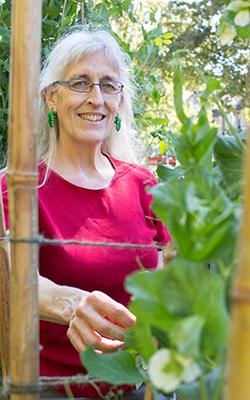
Melinda Suto
Since the program was established last year, the research team — which includes Dr. Suto, as well as Coast Mental Health’s CEO Darrell Burnham, Master of Occupational Therapy students Neysa Hale and Ursula Stansfield, and alumni, Dana Statham and Emma Brown — has established two distinct community gardens in Vancouver: the Coast Wellness Garden, on Seymour Street, and the Health and Wellness Garden, near Clark Drive. The number of garden participants has also grown, from 14 to 21, since the project began.
As one of the first studies to explore the topic in depth, the findings have the potential to make a significant contribution to the wider field of occupational science and help clarify what role gardening, and other leisure occupations, may play in the support of mental health rehabilitation.
“What we’re really interested in determining with this study is whether a low-tech leisure activity, like creating and maintaining a garden, can encourage better health, and social connections for those living with severe mental illness,” says Dr. Suto.
And, while it’s still early days, Dr. Suto and UBC Master of Occupational Therapy student researchers, say a number of benefits are already emerging.
Through interviews and direct observation of the study participants, there’s early indication that community gardening offers a welcome escape from the exhaustive nature of mental illness.
“Whether it’s living with intrusive voices, or mood swings, a mental illness can be very wearying,” explains Dr. Suto. “The garden can be a complete salve for that, as it provides people with a different way of being. They may be having voices, but they can still take part in the act of planting a seed, or picking out a weed. For many, that can make a huge difference to how they’re feeling.”
For gardener David Norman, who’s been coming to the Coast Mental Health Resource Centre for years, the introduction of the gardening program has given him something new to look forward to each day.
“It’s nice to have something that belongs to you, and you belong to it,” says Norman, standing beside his garden plot, bursting with carrot and radish tops. “That’s something that was missing for me before — I would come here and play a few rounds of pool, but I didn’t really have anything that I belonged to, or took care of, so it’s nice to have something to care for.”
Planting seeds, nurturing social connections
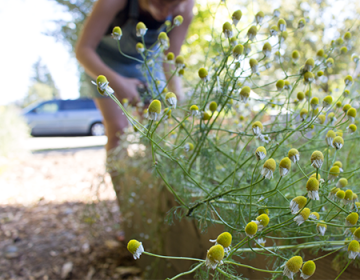
Chamomile harvesting at the Health and Wellness Garden, near Clark Drive, Vancouver.
Dr. Suto, who attends the weekly gardening sessions at each site, says that many of the gardeners have gained new confidence, thanks to the skills they’re developing and advice they’re taking away from workshops offered by local Vancouver-based horticultural therapist, Shelagh Smith.
“These gardens have really given people an opportunity to acquire skills,” says Dr. Suto. “They’re not only learning how to plant, and weed, but when to harvest and even how to incorporate some of the vegetables and fruit they produce into their weekly meals.”
With many of the gardeners also living in supported housing, some with little to no employment opportunities, the garden has also provided some unintended, but very welcome economic benefits.
“Last year, we produced so many vegetables that the gardeners were able to eat straight from the garden,” says Dr. Suto, acknowledging that even just a bit of additional produce can make a big difference to those living in supported housing.
For Dr. Suto, who has close to four decades of experience as an occupational therapist, and has dedicated her professional career to the field of mental health, one of the most rewarding observations has been the fact that the gardeners — many who live relatively isolated lives — are finding renewed purpose, and along the way, building new social connections.
“When we first met our study participants, many said that they were not satisfied with their social connections,” says Dr. Suto. “Gardening has begun to erode that a bit and some of our gardeners are even meeting up outside of the weekly sessions.”
While the program has helped foster greater social ties among many participants, for others, like Shurli Channe, the very act of gardening has become a vital part of her recovery.
“I’m drawn back every week because the garden has become a continuation of my recovery,” says Channe, who, after decades of living undiagnosed with bipolar disorder, eventually landed on the streets and in the shelters of Vancouver’s Downtown Eastside.
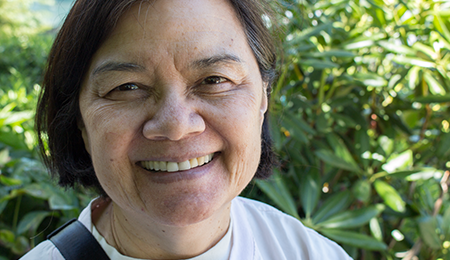
Shurli Channe
Fortunately, thanks to the actions of local health units on the eastside, Channe secured permanent housing and access to mental health support services through Coast Mental Health. Today, only seven years later, she serves as an active board member with the Coast Foundation Society, as a peer worker with Coast Mental Health, and as a volunteer on the Downtown Eastside.
And while Channe’s path to recovery began some time ago, since joining the community garden at Seymour Street in March, she’s gaining new hope.
“When I have my hands in the soil, I feel at ease — when you do something as simple as gardening, just putting your hands in the ground and watching something grow, you can’t help but smile,” says Channe. “When you look at someone like me, I shouldn’t be walking around as happy as I am, but I feel happier, and healthier than I ever have before.”
Budding opportunities
Next summer, when the research initiative wraps up, Dr. Suto and her team will dig deeper into the data, pouring over their observations and interviews with participants once again, to gain greater clarity into some of the early trends and observations that have emerged.
After publication, Dr. Suto, as well as her student researchers are keen to see the findings from their study applied by occupational therapists and other rehabilitation professionals in practice.
“It’s my hope that people will look at community gardening and see that it has a lot of potential to improve the lives of people with severe mental health issues living in supported housing,” says Dr. Suto.
Second-year Master of Occupational Therapy (MOT) students, Ursula Stansfield and Neysa Hale, who have spent the past year working alongside Dr. Suto to collect and analyze the data from this year’s participants, say they are both encouraged by what they’ve seen.
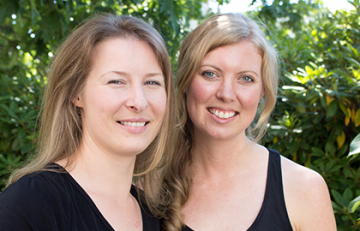
Ursula Stansfield and Neysa Hale
“The gardeners have been so welcoming and open,” says Stansfield. “I have felt very privileged to hear their stories, gain a small glimpse into their lived experience, and see, first-hand, just how powerful an activity, like community gardening, can be for people with severe mental illness.”
“It’s been a really meaningful project to be a part of,” adds Hale. “For me, it’s illustrated just how beneficial a simple activity can be and how important ‘occupations’ are for the maintenance of good health and wellbeing.”
Though the research is set to wrap up next summer, Dr. Suto hopes to see the program continue long after the study is finished.
“Even now, though we’re still a year away, we’re thinking about and talking about sustainability,” says Dr. Suto, who has established a project advisory group, consisting of two staff members at Coast Mental Health, as well as six garden participants, who play an active leadership role.
Dr. Suto has also started making connections with others across the Lower Mainland to see if similar opportunities, and new spaces, could be established for more individuals with severe mental illness living in supported housing.
And while the development of new sites may be many years down the road, the seeds of change are taking root.